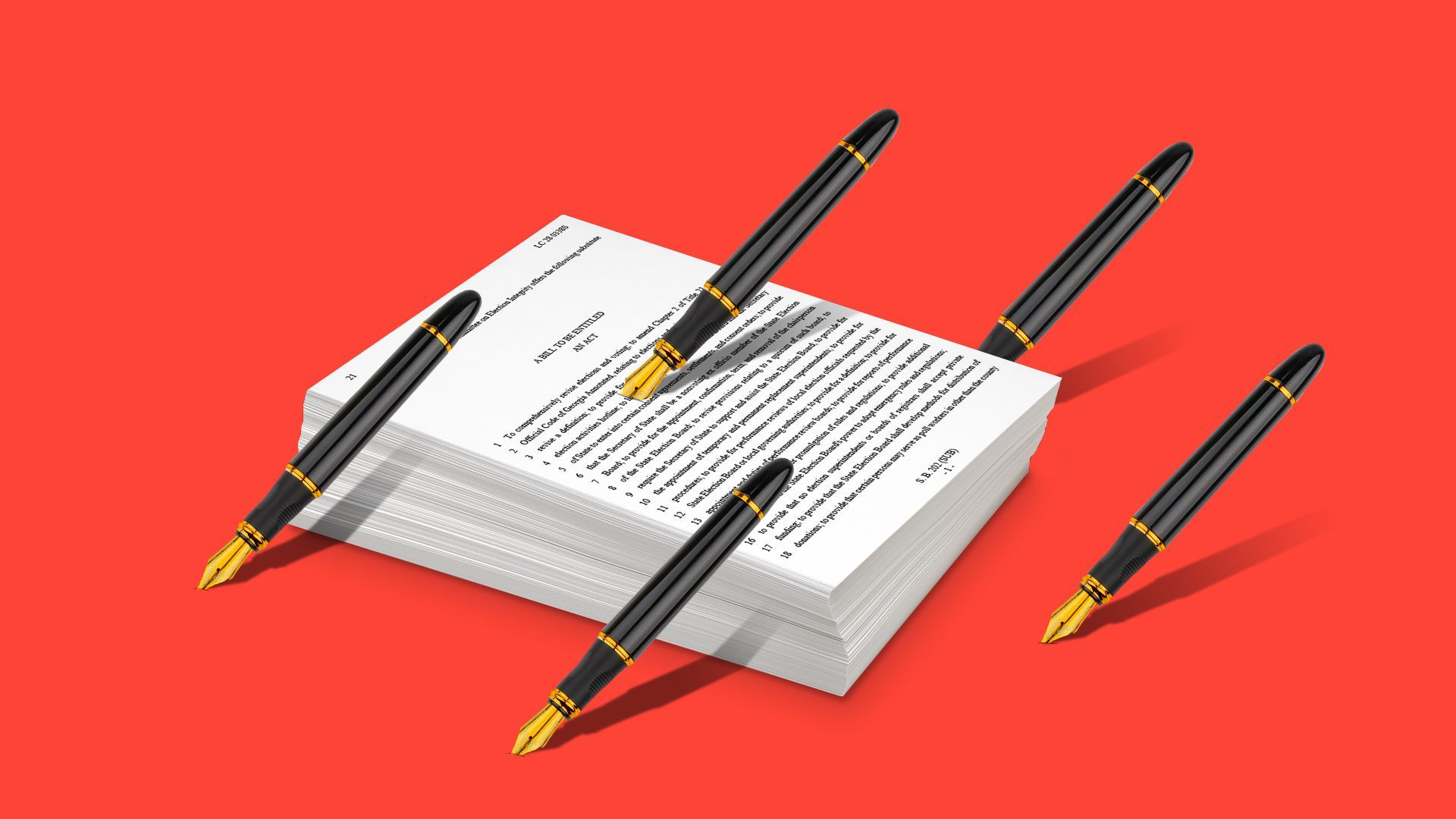| | | | | | | Presented By JPMorgan Chase | | | | Axios Generate | | By Ben Geman and Andrew Freedman · May 27, 2022 | | 🍩 Welcome back. Today's Smart Brevity count is 1,170 words, 4.5 minutes. - We'll be off Monday in observance of Memorial Day.
🚨 Breaking: The G7 set a goal of "predominantly" zero-carbon power by 2035 and urged OPEC to pump more oil amid the tight market. Read the communique. 🎶 50 years ago The Staple Singers were #1 on Billboard's R&B charts with today's all-timer of an intro tune... | | | | | | 1 big thing: California's hydropower challenge |  Data: U.S. Department of Energy; Chart: Baidi Wang/Axios The long-lasting, severe drought affecting California is likely to reduce electric grid reliability and increase electricity costs this summer, according to a new report from the U.S. Energy Information Administration, Andrew writes. Driving the news: The drought's depletion of California's large reservoirs is likely to strain hydroelectric plants to the point where some may have to be shut down. - For example, Lake Shasta, the state's largest reservoir, has only seen one other year when the reservoir storage was lower than it is now.
- The cut in hydropower, which typically supplies about 15% of California's summer electricity generation, will place more of a burden on natural gas plants and out-of-state resources.
- This will increase electricity rates and greenhouse gas emissions, according to EIA.
Threat level: A separate report from the North American Electric Reliability Corporation, whose mission is to monitor the grid and reduce reliability risks, found that there is an "elevated" danger of power disruptions in the West this summer due to the combined impacts of heat and drought. The big picture: As the Southwest grapples with a megadrought, the region's electricity mix is rapidly shifting, then EIA finds. - More solar and wind power is coming online, as fossil fuel plants are shut down in order to cut greenhouse gas emissions.
- According to the report, 58% of the state's natural gas units have been retired since 2015, amounting to 6,500 megawatts of generating capacity.
- At the same time, solar capacity has increased by 8,800 megawatts, and the state has deployed more battery storage.
- Still, there may be shortfalls between power demand and electricity supply, which the state makes up for by importing power from its neighbors. However, those states will also see strained power supplies from heat and drought, particularly Nevada and Arizona.
The bottom line: California is facing the simultaneous consequences of the effects of climate change, including heat waves, wildfires and drought, along with growing pains from the integration of climate solutions, such as solar and wind power plants, into the broader grid. Read more. |     | | | | | | 2. Manchin signals new life for Biden's climate bill |  | | | Illustration: Aïda Amer/Axios | | | | Sen. Joe Manchin (D-W.Va.) told Axios on Thursday he's earnestly engaged in talks with Senate Majority Leader Chuck Schumer (D-N.Y.) over a climate, energy and deficit reduction package, reviving hopes for action this year, Hans Nichols reports. Why it matters: Even a slimmed-down version of President Biden's Build Back Better package looked dead. But comments by Manchin, along with tempered optimism from some Democrats, suggest a Biden win on the Hill in this midterm year has gone from unlikely to possible. Behind the scenes: As Manchin and Schumer try to repair a strained relationship, their staffs have been making progress on the contours of a climate and deficit reduction package, according to people familiar with the matter. What we don't know: Whether there are better-than-long odds of a deal, and, of course, the potential specifics. Read Hans' scoop. |     | | | | | | 3. Electric cars offer cheaper holiday travel |  Data: Zeta; Chart: Axios Visuals More Americans than ever will be traveling in an electric vehicle this Memorial Day weekend, avoiding pain at the pump squeezing so many other families, Axios' Joann Muller reports. The big picture: The U.S. is in the early stages of an electric shift, with EVs just 4.6% of new car sales — up from 2.4% a year ago. State of play: EVs generally cost more than gasoline-powered vehicles. But they're often cheaper to operate over the vehicle's lifetime thanks to fuel and maintenance savings. The intrigue: So what if you made your holiday road trip in an EV instead of a gasoline vehicle? - We compared a 200-mile trip in a gas-powered Ford F-150 pickup (America's best-selling model) with the same trip in an electric F-150 Lightning.
- At $4.60 per gallon, it would cost $119.60 to fill a gas-powered F-150's 26-gallon tank (capacities vary based on configuration). Using power is cheaper.
Read Joann's whole story. |     | | | | | | A message from JPMorgan Chase | | A $1 trillion target for green initiatives | | |  | | | | JPMorgan Chase is targeting $1 trillion over 10 years to support climate action and sustainability. Take note: In 2021, the firm financed and facilitated $106 billion in support of green solutions, such as sustainable transportation and renewable energy. Learn more. | | | | | | 4. Planet FWD raises $10M to help brands cut carbon |  | | | Illustration: Aïda Amer/Axios | | | | Planet FWD, a startup helping consumer product companies assess and reduce their carbon emissions, has raised $10 million in Series A funding led by Acre Venture Partners and Congruent Ventures, Axios' Kia Kokalitcheva reports. Why it matters: As the urgency for mitigating climate change grows, companies are increasingly coming under the scrutiny of consumers and regulators for their contributions to greenhouse gas emissions. Catch up fast: In late 2020, Planet FWD debuted a line of fancy crackers developed and manufactured in a carbon-neutral way that also incorporates regenerative agriculture practices. - The process of developing the crackers exposed just how few tools are available to measure that carbon impact, CEO Julia Collins told Axios at the time. This led her to want to build those, too.
- The company last year acquired CleanMetrics 2.0, a provider of tools and databases for emissions accounting for consumer products.
Read more. |     | | | | | | 5. SCOTUS pre-games with a silent climate ruling |  | | | Illustration: Sarah Grillo/Axios | | | | The Supreme Court is letting the Biden administration continue using a key estimate of harms from carbon emissions in federal decision-making, for now, Ben writes. Driving the news: The high court, without comment, yesterday denied conservative-led states' bid to reverse an appellate stay of the "social cost of greenhouse gas emissions." Why it matters: Administration officials say freezing the use of their interim estimate would badly gum up rulemakings and environmental analyses. Catch up fast: The states, led by Louisiana, told the high court the estimate is a "power grab" to "manipulate America's entire federal regulatory apparatus through speculative costs and benefits." - But President Biden's lawyers told the court the challenge is premature, arguing plaintiffs can challenge final rules or decisions that rely on the estimate.
- The NYT has more.
The intrigue: The Supreme Court's quiet order comes as the body prepares to rule within weeks on the breadth of EPA's power to control emissions from power plants. The conservative-led court is expected to impose constraints, but it's unclear whether they'll create sweeping new limits on regulatory powers not explicitly granted by Congress. What they're saying: University of Maryland environmental law professor Robert Percival, in an email exchange, said yesterday's order doesn't hint at the upcoming opinion, but added: "The conservative justices who are about to cut back on EPA's authority...may not have wanted to rock the boat too much in advance of that decision." |     | | | | | | 6. Solar tariff probe splits Democrats |  | | | Illustration: Gabriella Turrisi/Axios | | | | A handful of congressional Democrats is joining the fight over the Commerce Department's investigation into whether China is dodging U.S. import tariffs on solar panels, Hans Nichols reports. Why it matters: Until now, most of the political firepower directed at the Biden administration has come from lawmakers and trade groups who want the probe to end without big new penalties that raise project costs. Driving the news: In a letter to President Biden, Sens. Sherrod Brown (D-Ohio) and Bob Casey (D-Pa.) are lining up against a bipartisan group of 22 senators who are urging the Biden administration to quickly wind down the investigation. The inquiry, requested by Auxin Solar, an American solar manufacturer, has effectively frozen big U.S. solar projects. What they are saying: "The bottom line is that short-term supply disruptions in the solar supply chain are no reason to abandon trade enforcement," Brown and Casey write in a letter with House members from their states. Read the whole story. |     | | | | | | A message from JPMorgan Chase | | The business case for a low-carbon economy | | |  | | | | JPMorgan Chase targets more than $2.5 trillion through the end of 2030 to advance long-term solutions that address climate change and contribute to sustainable development. The target focuses on three key areas: - Green solutions.
- Community development.
- Development finance.
Learn more. | | | | 📬 Generate returns to your inboxes on Tuesday. Enjoy the long weekend. |  | It's called Smart Brevity®. Over 200 orgs use it — in a tool called Axios HQ — to drive productivity with clearer workplace communications. | | | | | | Axios thanks our partners for supporting our newsletters. If you're interested in advertising, learn more here.
Sponsorship has no influence on editorial content. Axios, 3100 Clarendon Blvd, Suite 1300, Arlington VA 22201 | | | You received this email because you signed up for newsletters from Axios.
Change your preferences or unsubscribe here. | | | Was this email forwarded to you?
Sign up now to get Axios in your inbox. | | | | Follow Axios on social media:    | | | | | |
Post a Comment
0Comments